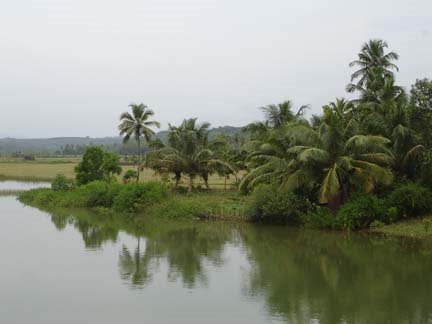The Nairs of Malabar have traditionally adapted to the custom of Taravada, which is a custom of reverence to the original joint-family house. The Nairs, are considered to have been immigrants from Nepal who settled in the West coast (Karavali and Malabar) during the early centuries of the Christian era. In Nepal they were known as Neyers, according to Zacharias Thundy. The immigrant Nair fraction settled in Tulunad adapted to farming and subsequently merged with local farmers, the ‘Okkelakulu’(Gururaja Bhat,1970). Thus as a consequence of assimilation of Nair fractions that followed Theravada customs, the Tulu farming community, now known as ‘Bunts or Nadavas’ have also adapted to the Taravada custom. This indirectly suggests that Buddhism was prevalent in Tulunadu, along with the cult of spirit worship, in the early centuries of the Christian Era.
Moolasthana and Taravada
The concept is chronologically later extension and evolution of the ‘Moolasthana’ concept. The ‘Moolasthana’ concept (origin and development: ca. 2000-800 BC) emphasized on the original place (hamlet or part of village) of settlement which was held sacred for the progeny of the particular group or clan (which may include several later formed communities).Whereas the Taravada or Theravada concept evolved during early Buddhist period, derived from the Theravada school (ca. 250 BC), concentrated on the reverence to the Family house of origin. The chronological evolution of notion of original habitation to original family house is notable.
Buddhist school
The concept and school of Theravada Buddhism, coincides with the life and times of King Ashoka. Theravada in Pali language means the ‘path of the elders’. [Theravada (Pali)> Sthavira-vada (Sanskrit)]. It is said that the Nairs were brought along with Brahmins by Kadamba King Mayura Sharma (ca.450 AD) to maintain newly built temples of Tulunadu. However, available evidences point to the existence of Buddhism in Tulunadu (Mayi kala and Kadarika Vihar, at Mangalore).Thus it is not clear at this moment whether the Buddhist concept of ‘Taravada’ was introduced to Tulunadu/Malabar by the Nairs or by other Buddhist monks that arrived here before the Nairs.
Gujarat connection
The word Taravada has several connections with Gujarat. Taravada, incidentally, is also the name of a village in the Amreli district of Gujarat. There is another Haripar Taravada village in Lodhika Tehsil of Rajkot district of Gujarat. In Gujarat, presently some Vaishnav Gurukuls like Swami Narayan are also called Taravada.
Sunday, January 6, 2008
Subscribe to:
Post Comments (Atom)
Blog Archive
Books for Reference
- A Comparative Study of Tulu Dialects By Dr. Padmanabha Kekunnaya. Govinda Pai Reserach Centre, UDupi. 1994
- Koti Chennaya: Janapadiya Adhyayana. By Dr. Vamana Nandavar. Hemanshu Prakashana ,Mangalore.2001.
- Male kudiyaru. Dr B. A.Viveka Rai and D.Yadupathi Gowda, Mangalore University,1996.
- Mogaveera Samskriti By Venkataraja Punimchattaya. Karnataka Sahitya Academy.1993.
- Mugeraru:Jananga Janapada Adhyayana. By Dr Abhaya Kumar Kaukradi.Kannada & Culture Directorate,Bangalore & Karnataka Tulu Academy, Mangalore,1997.
- Puttubalakeya Pad-danagalu. Ed: Dr B.A.Viveka Rai,Yadupati Gowda and Rajashri, Sri Dharmasthala Manjunatheswara Tulu Peeta. Mangalore University.2004
- Se'erige. Ed:Dr K.Chinnapa Gowda.Madipu Prakashana,Mangalagangotri,2000.
- Studies in Tuluva History and Culture.by Dr P Gururaja Bhat (1975).Milagres College,Kallinapur,Udupi.
- Taulava Sanskriti by Dr.B.A.Viveka Rai, Sahyadri Prakashana,Mysore 1977
- TuLu naaDu-nuDi By Dr.PalthaDi Ramakrishna Achar, Puttur.
- TuLu NighanTu. (Editor in Chief: Dr U.P.Upadhyaya, Govinda Pai Research Centre,Udupi. Six volumes. 1988 to 1997
- Tulu Patero-A Philology & Grammar of Tulu Language by Budhananda Shivalli.2004.Mandira Prakashana Mangalore. p.317. (The book is in Tulu Language using Kannada script)
- TuLunadina ShasanagaLa Sanskritika Adhyayana. By Shaila T. Verma (2002) Jnanodaya Prakashana,Bangalore, p.304.(Kannada)
- Tuluvala Baliyendre. Compiled by N.A.Sheenappa Hegde,Polali,Sri Devi Prakashana,Parkala,1929/1999
* Landscape images *
A Coastal estuary

Holegadde near Honavar,Uttara Kannada dist, Karnataka
Copy? Right - but kindly remember to acknowledge!
" tulu-research.blogspot." ತುಳು ರಿಸರ್ಚ್. ಬ್ಲಾಗ್ಸ್ಪಾಟ್. ಇನ್

Have a nice day !

No comments:
Post a Comment